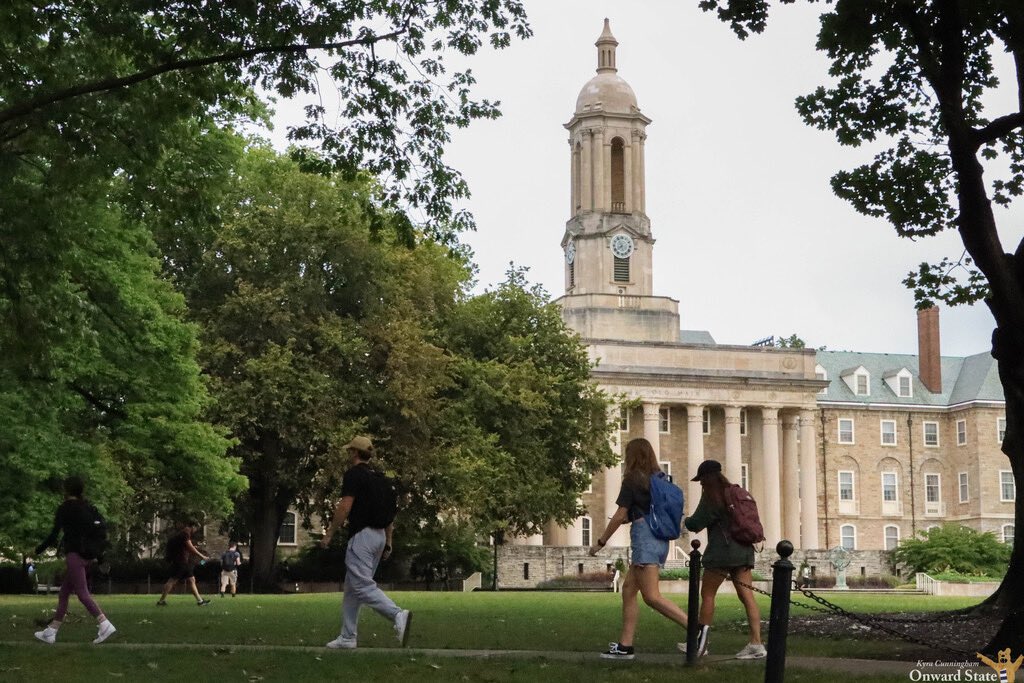Update 2:13 p.m. July 18, 2025: The full Penn State Board of Trustees voted 31-3 to approve the budget, tuition rates and room and board rates for 2026-27 during its meeting Friday afternoon at the Abington campus. Alumni-elected trustees Anthony Lubrano, Matt McGloin and Jay Paterno voted no.
Penn State is poised to increase tuition rates for all students at University Park and some students at Commonwealth Campuses in 2026-27 as part of a proposed $10.1 billion budget.
The Board of Trustees Finance and Business Committee recommended approval of the proposal, which also includes increases to room and board rates, at a meeting on Thursday afternoon. Trustee Anthony Lubrano was the sole no vote, saying he could not support tuition increases.
The full board will vote on proposal during its meeting on Friday at the Abington campus. After introducing a two-year budgeting model in 2023, the university’s budget, tuition and room and board rates are set a year in advance.
At University Park, tuition will increase by 2% for in-state undergraduate and graduate students and 4% for out-of-state students. The increase will represent an addition $410 for the academic year for lower division undergraduate students, bringing their annual tuition to $20,878. For out-of-state, lower division undergraduates, it marks a $1,714 increase and brings tuition for the academic year to $44,574.
The approximately 18,000 Pennsylvania resident undergraduate students at Commonwealth Campuses —about 42% of the university’s in-state undergrad population — will see no tuition increase for the fourth consecutive year.
“This is really important for us as we think about affordability,” Sara Thorndike, senior vice president for finance and business, said.
Out-of-state undergraduates and in-state graduate students at Commonwealth will have a 1% increase, while out-of-state graduate students at the campuses will have a 2% increase.
World Campus will see a 1% increase and Dickinson School of Law will have a 2% increase for all students. Tuition at the College of Medicine will increase by 2% for in-state students and 4% for out-of-state.
It marks the sixth consecutive year with at least some Penn State students seeing a tuition hike.
President Neeli Bendapudi said the university has taken “aggressive actions” in the first three year of her presidency to address inefficiencies and costs, including hiring freezes, budget reductions, voluntary separation offers and planned campus closures.
But like other universities, she said, Penn State faces rising costs for benefits, wages and other “inflationary pressures,” as well as uncertainty with state and federal funding.
“So at this point I can confess that I’m not comfortable that we would be able to achieve a balanced budget without a very, very modest increase in in-state tuition for University Park students,” Bendapudi said. “I want you to know that this was not a decision that any of us, me or my team, arrived at easily because we know affordable education is critical.”
She added that the increase for University Park undergrads is “definitely on par and in some cases significantly lower than what you will see” at fellow state-related schools Pitt and Temple and among Penn State’s Big Ten peers.
Tuition increases will generate about $52 million, money that will be used largely toward $73 million in added faculty and staff costs. Those include 3% merit-based increases, faculty promotions and professional development, negotiated salary increases for unions and increased health care expenses, as well as a 4% stipend increase for graduate assistants.
The balance of those costs will be covered by projected enrollment growth and budget redistributions, Thorndike said.
“I’ve been on the Finance Committee a long time and I’ve watched us squeeze the budget, squeeze the people, ask them to do more with less from top to bottom. And over and over our faculty, our staff, they have been part of this success of getting to a balanced budget,” trustee Rob Fenza said. “I really sincerely believe we owe it to them to give them a proper raise and the support that they need to support their families in this environment. And most of this tuition increase just gives us the ability to do that.
“…Overall we’ve got an incredible team that I believe deserves our support and I will support this tuition increase even though I’ve had the same kind of thoughts laying in bed at night saying ‘How can we do this?’ I mean we’re we we’re damned if we do and we’re damned if we don’t and I think our people deserve the support.”
The full 2026-27 tuition and fees schedules will be online at tuition.psu.edu/tuition-schedules once approved by the board.
Room and Board
The budget includes a 2.85% increase — or $198 per semester — for the standard double room and mid-level meal plan at University Park. The increases will bring the average room and board cost to $7,138 per semester, or $14,275 per academic year.
Room and board rates at Commonwealth Campuses vary by campus. For Abington, Altoona, Beaver, Berks, Brandywine and Harrisburg, average rates will increase by 1.64%, or $110 per semester, for a total cost of $6,815 per semester. At other campuses, rates will increase by 0.62%.
The increases are Penn State’s lowest since 2019-20 and the planned rates are below the Big Ten average of $15,505 per year, according to the presentation to the committee.
“”We continue to face expense increases, such as rising costs for food, fuel, utilities and supplies, and have made a concerted effort to keep our rates as low as possible, while continuing to offer students comfortable and safe living spaces and high-quality dining experiences,” Thorndike said.
Planned 2026-27 rates for all housing types are listed here and will be posted at liveon.psu.edu/rates.



